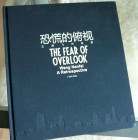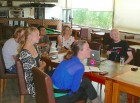In the thousands of people I meet in Beijing (I have about 3,000 business cards), there are some colorful figures you learn to appreciate and who become good friends.
One is Charles, with whom I have long conversations on China, our ups and downs, on photography and whatever. And we can tackle very well a couple of beers. Charles is also a valuable contributor to my book Toxic Capitalism, through his pictures and his advice.
So I was impressed with part of his life story here:
http://www.sino-us.com/21/A-Vietnam-War-veteran-living-in-China.html
His wife, Wang Nanfei, is an exceptional lady, a remarkable artist, a bit shy and mostly too modest.
Here messages (edited) I had sent to Charles:
1 a.m. I’m sitting in my library. This black book is staring at me. What is this: “The Fear of Overlook”?
Damn! It’s Nanfei’s book.
So dark, so troubling; I don’t like the style. But, still, it fascinates me.
‘Kiss’ So simple, yet so deep. ‘Warm Sun’ only I understand?
Nanfei is not of this world. Her style sometimes hurts the eye; still, you want to look again: very special, troubling, unique.
She is deep: too much of a knife cutting you, but you reluctantly stay for more.
Man, you don’t know what you have on your side. Maybe the world will one day discover her. Her problem is that most of her work … you don’t want to look at it every day (OK, that is in my case). It’s provocative and hurting.
Her book (not showing the so-called “troubling” pieces)
She is a genius.
I knew it when I saw her the first time. I looked into her eyes and saw a whirlpool, lava turning around. A very special lady. Believe me, I might be over-complex, but I can see what others don’t. Let’s have a beer sometime. Take care my friend. Send her my thoughts.”
Gilbert – Beijing, 30 July 2012








